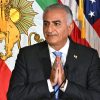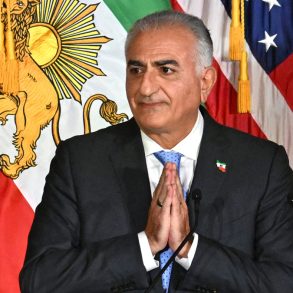For decades, the United States has provided a nuclear shield over Europe, deterring potential threats from adversaries like Russia. This so-called “nuclear umbrella” has been a pillar of NATO’s collective security, ensuring that an attack on one member would be met with a powerful, potentially nuclear, response from the U.S. However, former President Donald Trump’s foreign policy stance has caused many European leaders to question whether they can still rely on this protection. Some now claim that Trump has “punched holes” in the nuclear umbrella, leaving Europe exposed and uncertain about its security future. But what does this mean, and what alternatives exist?
What Is the Nuclear Umbrella?
The nuclear umbrella is a strategic concept in which a nuclear-armed country extends deterrence to its allies, pledging to use its nuclear arsenal to defend them if necessary. For NATO, this means that the U.S., with its vast nuclear capabilities, promises to protect European allies from external threats, primarily from Russia. This arrangement has historically prevented nuclear proliferation in Europe, as nations like Germany and Poland did not need to develop their own nuclear weapons.
NATO’s nuclear strategy has long relied on the credibility of U.S. commitments. The U.S. maintains nuclear weapons in Europe under its nuclear-sharing agreements, with bombs stored in Germany, Italy, and the Netherlands. However, if European leaders begin to doubt U.S. willingness to use these weapons in defense of NATO allies, the deterrence effect weakens.
What Does It Mean to “Punch Holes” in the Umbrella?
When critics say Trump has “punched holes” in the nuclear umbrella, they mean that his rhetoric and policy decisions have weakened European confidence in U.S. commitments. His “America First” approach, transactional diplomacy, and suggestions that NATO allies should shoulder more of their own defense costs have led some European leaders to fear that the U.S. may not come to their aid in a crisis. This perception undermines the credibility of nuclear deterrence, as deterrence relies on the unwavering belief that the threat is real.
How Has Trump Allegedly Undermined the Nuclear Umbrella?
Trump’s approach to NATO and nuclear security has raised alarms across Europe in several ways:
- Questioning NATO’s Article 5: Trump has repeatedly cast doubt on whether the U.S. would uphold Article 5 of the NATO treaty, which states that an attack on one member is an attack on all. “The credibility of U.S. nuclear dissuasion is not what it was,” said Pierre Haroche, a defense expert at the Catholic University of Lille.
- Calling for Reduced U.S. Commitments: He has suggested that European nations should take on greater responsibility for their own defense, implying that the U.S. might not provide the same level of security guarantees as in the past. At a speech in Munich, U.S. Vice President JD Vance reinforced this view, saying Europe must “step up in a big way to provide for its own defense.”
- Sympathy Toward Russia: His perceived closeness to Russian President Vladimir Putin has fueled concerns that he might be less willing to confront Russian aggression in Eastern Europe. Polish Prime Minister Donald Tusk expressed concern that “the contribution by America must now be to some degree in doubt, not today or tomorrow, but over the next few years.”
- Reduced U.S. Nuclear Presence in Europe: Reports indicate that the U.S. may be repositioning nuclear warheads or reducing its strategic footprint in Europe, further fueling fears of diminished deterrence. A February report from the Federation of American Scientists pointed to “mounting evidence from three years of collection of documentation and observations” that indicate the U.S. is preparing to redeploy nuclear warheads to its main airbase in the UK for the first time in over 15 years.
Who Is Raising Concerns?
Several European leaders and analysts have voiced concerns about the reliability of U.S. nuclear deterrence under Trump:
- Germany’s Next Chancellor, Friedrich Merz, has called for discussions with France and the U.K. about extending their nuclear protection to Germany. “In view of the threats to our freedom and peace on our continent, the rule for our defense now has to be, whatever it takes,” he stated.
- Polish Prime Minister Donald Tusk has supported closer cooperation with France and the U.K., even suggesting that Poland should host nuclear weapons. “It’s not only that the time has come, but that it would be safer if those weapons were already here,” said Polish President Andrzej Duda.
- Defense analysts like Pierre Haroche argue that Trump’s actions have “clarified the debate” by forcing Europeans to consider nuclear alternatives. “If the U.S. is to be less present, then European countries will be depending much more on each other,” he said.
Who Disagrees?
Not everyone believes Trump has undermined the nuclear umbrella:
- NATO Secretary-General Mark Rutte and other NATO officials maintain that the U.S. remains committed to its nuclear deterrence strategy.
- Lithuanian Prime Minister Gintautas Paluckas has dismissed the idea that the U.S. would abandon its nuclear commitments, arguing that doing so would only encourage nuclear proliferation in Europe. “The U.S. will never give up this nuclear umbrella, because giving it up will encourage the development and spread of nuclear weapons in Europe and other countries,” he stated.
- U.S. Military Leaders continue to emphasize the importance of NATO and the nuclear umbrella, highlighting ongoing military exercises and strategic bomber patrols over Europe as evidence of commitment.
What Are the Alternatives?
If trust in U.S. nuclear deterrence erodes, Europe must explore alternative security arrangements. Several possibilities have been discussed:
- A European Nuclear Umbrella: French President Emmanuel Macron has suggested extending France’s nuclear deterrent to cover more European allies. “Europe’s future does not need to be decided in Washington or Moscow,” Macron said.
- Nuclear Sharing and Deployment: Some analysts suggest positioning French nuclear-capable aircraft in Germany or Poland as a deterrent measure. “One option might be to position French nuclear-armed planes in other countries, such as Germany or Poland,” Haroche suggested.
- Independent Nuclear Programs: If confidence in U.S. protection continues to decline, nations like Germany or Poland could develop their own nuclear weapons, although this would be costly and politically controversial.
- Increased Conventional Forces: Even without new nuclear capabilities, European nations could significantly boost their conventional military forces, making them less reliant on nuclear deterrence.
The Future of Nuclear Security in Europe
While Trump has raised doubts about U.S. commitments, the nuclear umbrella has not disappeared. The U.S. still maintains nuclear weapons in Europe, and NATO remains a powerful alliance. However, the mere perception that America’s nuclear guarantees are weakening is enough to shift European defense strategies. Whether through closer ties with France and the U.K., nuclear sharing, or even new nuclear programs, European leaders are exploring ways to ensure their security in an increasingly uncertain world.
NP Editor: Nobody with common sense believes that Trump will abandon Europe in the event of war, much less nuclear war. But Europe has been shirking its duties in paying for its own defense, and Trump is calling them on it. This is Trump’s negotiating strategy and it is a good one, designed to spur exactly this particular debate.








